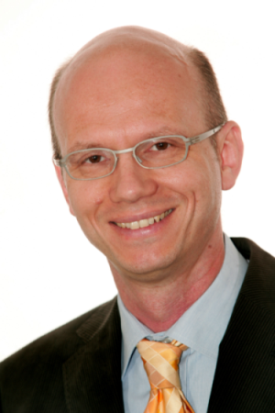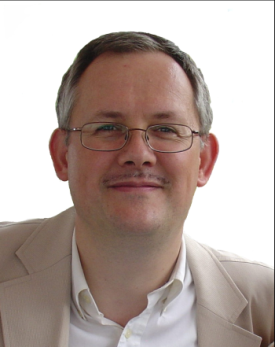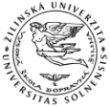Tutorials
Reliability Modeling and Simulation of Complex Dynamic Discrete Event Systems
Abstract
This tutorial covers motivation, use, and advantages of stochastic Petri nets as a tool for reliability evaluation of complex systems. Rare-event simulation techniques are demonstrated, which are applicable to a wide class of reliability problems. While this approach is known in the academic world, it has not yet been adopted much in industrial applications despite its apparent benefits.
Additional triggers for this tutorial are advances in rare event simulation for this model class as well as the recent standard IEC62551 for dependability evaluation with Petri nets. New results in performability evaluation using an integration of simulation and numerical analysis are presented. Example case studies and tool support is demonstrated.
You can download the full tutorial info here in pdf format. 
Curriculum Vitae
Armin Zimmermann studied computer science at Technische Universität Dresden and Technische Universität Berlin. Since 1994 he was with the performance evaluation group of Prof. Hommel at TU Berlin. His PhD thesis proposed a modelling and analysis method for manufacturing systems based on coloured Petri nets. The thesis received the Krone award, the Carl Ramsauer award, and the Chorafas Foundation award. Armin Zimmermann held a position as a research fellow 1995-1999 and 1999-2006 as PostDoc research assistant at TU Berlin. During this time he was the principal investigator of the research group Model-Based Evaluation of Discrete Real-Time Systems and coordinated the graduate research training group "Stochastic Modelling and Quantitative Analysis of Complex Systems in Engineering". He is project manager of TimeNET software development since 1996. In 1998 and 1999 he was a visiting scientist at the Universidad de Zaragoza, Spain, in the research group of Prof. Silva. He was a guest lecturer at Shanghai Jiao Tong University in 2001 and at the Hasso-Plattner-Institute for IT Systems Engineering of University Potsdam 2003 - 2006. His Habilitation was awarded in 2006 with a work on Stochastic Discrete Event Systems, which is available as a Springer book.
He worked as a guest professor at the Hasso Plattner Institute for Software Systems Engineering at the University of Potsdam, and held a substitute professorship for Real-Time Systems and Robotics at TU Berlin. In summer 2008 he was appointed head of the System and Software Engineering group at Technische Universität Ilmenau, in the Computer Science and Automation faculty. Since 2012 he serves as director of the Institute for Computer and Systems Engineering at TUI.
Since 2008 he serves as Associate Editor of IEEE Transactions on Industrial Informatics in the area Formal Methods, Distributed & Discrete Event Systems in Automation and Embedded Systems. He is a member of the Industrial Automated Systems and Controls Subcommittee of the IEEE IES Technical Committee on Factory Automation (TCFA). Armin Zimmermann is editorial board member of the Int. Journal of Critical Computer-Based Systems (IJCCBS).
He teaches courses on Modelling, Performance analysis and Simulation, Software Engineering, Robotics, Real-time and Embedded Systems, Automation, and Operating Systems.
He is a member of the IEEE and the German Informatics Society (GI). His research interests include modelling, performance and dependability evaluation, optimization, and control of technical systems using discrete-event models as well as their tool support.

Prof. Dr.-Ing. Armin Zimmermann
Technische Universität Ilmenau
Systems and Software Engineering
Ilmenau, Germany
DEVS Modelling and Simulation
Abstract
DEVS is a popular formalism for modelling the structure and dynamics of complex systems using a discrete-event abstraction. At this abstraction level, a timed sequence of pertinent "events" input to a system (or internal to the system, in the case of timeouts) cause instantaneous changes to the state of the system. The syntax and semantics of DEVS are precisely defined, and support modular composition. DEVS allows for performance analysis, realtime execution, and interoperation with real-world systems. DEVS may serve as a "simulation assembly language" to which other discrete-event simulation languages such as Statecharts, Timed Automata and Cellular Automata can be mapped, preserving behaviour traces. DEVS' modular composition allows models in these different formalisms to be meaningfully coupled, after their translation to DEVS. DEVS has also been used as a hierarchical framework for co-simulation or orchestration of discrete-event simulators. This tutorial introduces the Classic DEVS formalism in a bottom-up fashion, using a simple traffic light example. The syntax and operational semantics of Atomic (behavioural) models are introduced first, followed by Coupled (structural) models.
Applications of DEVS are introduced by an example in performance analysis of queueing systems. The tutorial uses the tool PythonPDEVS, though this introduction is equally applicable to other DEVS tools.
Curriculum Vitae
Yentl Van Tendeloo is a PhD student at the University of Antwerp (Belgium). He is a member of the Modelling, Simulation and Design (MSDL) research lab. In his Master's thesis, he worked on MDSL's PythonPDEVS simulator, a parallel and distributed simulator for Classic DEVS, Parallel DEVS, and Dynamic Structure DEVS with support for computational resource usage models. The topic of his PhD is the conceptualization and development of a new meta-modelling framework and model management system called the Modelverse.
Hans Vangheluwe is a Professor at the University of Antwerp (Belgium), and an Adjunct Professor at McGill University (Canada). He heads the Modelling, Simulation and Design (MSDL) research lab distributed over both locations. He has a long-standing interest in the DEVS formalism and has contributed fundamental and technical research results to the DEVS community. In a variety of projects, often with industrial partners, he develops and applies the model-based theory and techniques of Multi-Paradigm Modelling (MPM). His current interests are in domain-specific modelling and simulation, including the development of graphical user interfaces for multiple platforms. He is co-founder and chair of the European COST Action IC1404 "Multi-Paradigm Modelling for Cyber-Physical Systems" (MPM4CPS).

Hans Vangheluwe and Yentl Van Tendeloo
Universiteit Antwerpen
Antwerp, Belgium
Developing Reactive Systems with Statecharts
Abstract
Statecharts, introduced by David Harel in 1987, is a formalism used to specify the behaviour of timed, autonomous and reactive systems using a discrete-event abstraction. It is an extension of Timed Finite State Automata which adds depth, orthogonality, broadcast communication and history. Its visual representation is based on higraphs, which combine graphs and Venn diagrams. Many tools offer visual editing, simulation and code synthesis support for the Statecharts formalism. Examples include STATEMATE, Rhapsody, Yakindu, and Stateflow, each implementing different variants of Harel's original Semantics. This tutorial introduces Statecharts modelling, simulation, and testing.
As a running example, the behaviour of a traffic light, a simple timed, autonomous and reactive system is modelled. We start from the basic concepts of states and transitions and explain the more advanced concepts of Statecharts by extending the example incrementally. We discuss several semantics variants, such as STATEMATE and Rhapsody. We use Yakindu to model the example system.
Curriculum Vitae
Simon Van Mierlo is a post-doctoral researcher at the University of Antwerp (Belgium). He is a member of the Modelling, Simulation and Design (MSDL) research lab. During his PhD thesis, he developed debugging techniques for modelling and simulation formalisms by explicitly modelling their operational semantics using Statecharts. He is the main developer and maintainer of SCCD, a hybrid formalism that combines Statecharts with Class Diagrams.
Hans Vangheluwe is a Professor at the University of Antwerp (Belgium), and an Adjunct Professor at McGill University (Canada). He heads the Modelling, Simulation and Design (MSDL) research lab distributed over both locations. In a variety of projects, often with industrial partners, he develops and applies the model-based theory and techniques of Multi-Paradigm Modelling (MPM). His current interests are in domain-specific modelling and simulation, including the development of graphical user interfaces for multiple platforms. He is co-founder and chair of the European COST Action IC1404 "Multi-Paradigm Modelling for Cyber-Physical Systems" (MPM4CPS).

Hans Vangheluwe and Simon Van Mierlo
Universiteit Antwerpen
Antwerp, Belgium



